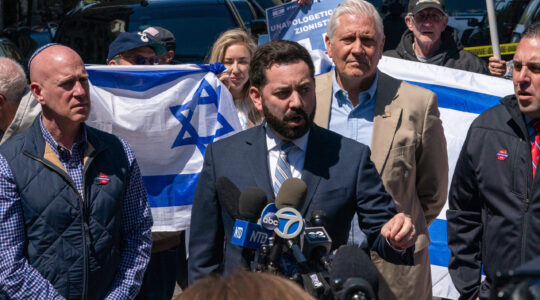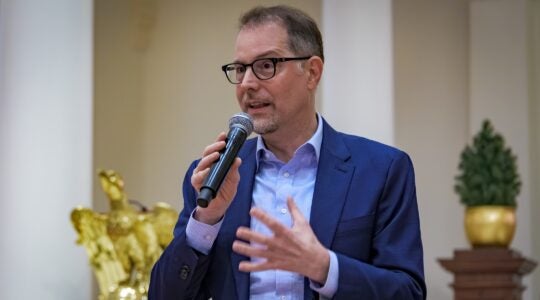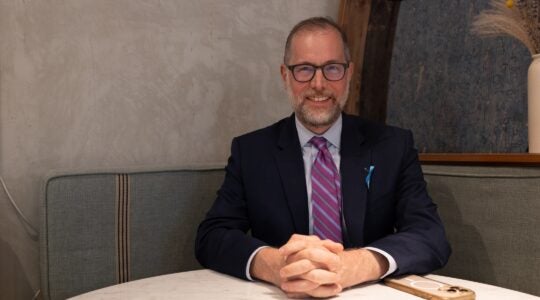WASHINGTON (JTA) — It all started with a cold call.
Bakari Sellers was moving into his student government office as president of Morehouse College one day in 2004 when he picked up the phone and AIPAC staffers Jonathan Kessler and Michael Glassman were on the other end. They were calling up the student body presidents of historically black colleges and universities and inviting them to the pro-Israel lobby’s annual policy conference.
Sellers said he didn’t know anything about AIPAC at the time — but he believed in being open-minded.
“The voice on the other end sounded kind of nurturing and understanding, and I said I don’t have anything to lose,” Sellers recalled.
In the end, his experience at the AIPAC parley was so positive and memorable that the 24-year-old has been to four more policy conferences. More importantly, Sellers is beginning his second term as a member of the South Carolina House of Representatives this month, and he credits AIPAC with helping him acquire some of the skills and contacts that assisted him in his succesful bid to become a state lawmaker.
“The way I’m able to communicate, the exposure, the people that I’ve met — a lot of people I’ve met at the AIPAC policy conference became a huge part of my fund-raising base,” Sellers said during an appearance in Washington late last month at AIPAC’s biannual Saban Leadership Seminar for college students.
Sellers joined two other recently elected state legislators — all non-Jews, although AIPAC officials said that was not intentional — to speak at the seminar about their experiences with the pro-Israel organization.
In an era when debates have raged over the tactics and influence of the pro-Israel lobby, the stories of how student leaders became and remained involved with AIPAC provides a window into how the organization is able to effectively cultivate relationships throughout the political world.
“For many years we’ve worked to identify and engage future policymakers and opinion leaders,” said Kessler, AIPAC’s leadership development director. “It’s a matter of becoming a Middle East resource for those who are eager to understand these issues and their complexities.”
Key to AIPAC’s approach to building support among future political leaders is its willingness to give young activists lots of responsibility, from lobbying their hometown members of Congress to setting up programs on their campuses.
“There aren’t that many people saying” to college-age men and women that “we want to invest in you” and “we’re going to show you how you can make a difference,” Kessler said.
December’s Saban seminar attracted 400 students, about a quarter of whom, according to AIPAC, were not Jewish.
University of Minnesota senior Julia Krieger was one, attending her seventh Saban seminar. Her involvement began as a freshman, when her Jewish roommate, knowing she was interested in politics, introduced her to a friend who was starting an AIPAC group on campus.
Her first Saban retreat, Krieger recalled, was exciting and eye opening because of the “passion” for political activism that was on display.
“I saw people who weren’t as apathetic as I had seen on my campus and high school,” she said. “Everyone was politically active just like me.”
“It’s cool to be around people united in one cause or one thing,” said Lance Bonner, a junior at the University of Pittsburgh who attended his first Saban seminar last month.
Bonner was invited by a leader of the campus pro-Israel organization after his appointment last semester to the student government board.
Seeing so many other politically active students “makes you want to be politically active” and “do something positive with your community,” he said.
Krieger has subsequently become involved both in her campus pro-Israel group and campus and state College Democrats, and said she “never would have had the same type of confidence in organizing for elections” without AIPAC.
Krieger said she hadn’t known much about Israel or the Middle East before her involvement with AIPAC, but was attracted to the cause of supporting the Jewish state because of human rights issues.
“The fact that women can vote and serve in the army, that gay people can marry — that was something that really got my attention,” she said.
Sellers also said he had little knowledge of the Middle East when he received the call five years ago from Kessler and Glassman, the AIPAC national field director, “but I knew my horizons were going to be broadened.”
While he quipped that “there might have been about six or seven black people” at that conference, “and I might be adding a few,” Sellers said the opportunity to see members of Congress and other “people that one day you knew you wanted to grow up and be like” was pretty special.
At the roll call of student government presidents on the conference’s final evening, however, Sellers didn’t hear his name read. He mentioned it to AIPAC staffers and they apologized, and told him they would make it up to him.
The next morning, as President Bush waited in the wings to speak, an announcement was made — that Sellers’ name had been forgotten in the previous night’s roll call.
“That attention to detail, that coalition building, that message that they sent to me” is the reason so many people come to AIPAC events, said Sellers.
His affiliation with AIPAC began with student government, but another member of the panel connected with the group as a leader of the College Republicans.
Former College Republican co-chairman Nick Miccarelli, who was sworn in earlier this month as a member of the Pennsylvania House of Representatives, said the friends he made at the two policy conferences he attended and the AIPAC “Campus Alllies” trip to Israel he took “have helped me incredibly in my ventures back in Pennsylvania.”
“AIPAC allowed me to become friends with the future leaders of this country, Republican and Democrat,” Miccarelli said.
Miccarelli said he was a “100 percent supporter of Israel” before he ever found AIPAC, but the organization “really helped me hone some of my beliefs” and “turn those inherent beliefs I had into tangible and well-expressed policies.”
“Some of it is verbiage, how to go about supporting Israel,” he said, but AIPAC also taught him about the issue of divestment from Iran, which he then spoke about with voters in his district.
“I’ve always been a good arguer,” said Miccarelli, but “they do such a good job at teaching people how to more effectively get their thoughts across.”
“They’re not just building Israel advocates,” he said, “they’re building future leaders on a variety of issues. ”
Sellers said he is still learning about the Middle East but credits AIPAC with helping develop his foreign policy.
“One day, if I ever do anything else,” said Sellers, “the start I got in understanding issues outside Denmark, S.C., began with my experiences with AIPAC.”
JTA has documented Jewish history in real-time for over a century. Keep our journalism strong by joining us in supporting independent, award-winning reporting.





